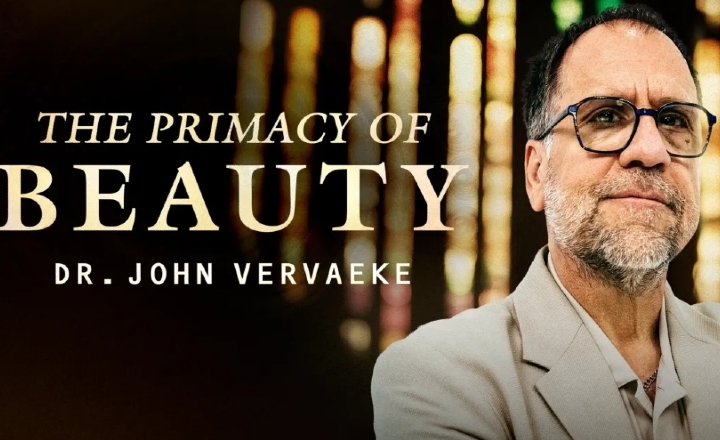🌟 New Year Offer 🌟
Celebrate 2025 with 30% OFF on all products! Use code: NEWYEAR2025. Hurry, offer ends soon!
A nine-hour course, Dr. John Vervaeke explores the profound relationship between beauty, cognition, and meaning through an interdisciplinary lens combining philosophy, cognitive science, and religious thought.
File Size: 14.979 GB.
Format File: 8 MP4, 8 SRT, 9 TXT.
John Vervaeke – The Primacy of Beauty

Dr. John Vervaeke
Cognitive Scientist
In The Primacy of Beauty, a nine-hour course, Dr. John Vervaeke explores the profound relationship between beauty, cognition, and meaning through an interdisciplinary lens combining philosophy, cognitive science, and religious thought. The lectures examine how beauty functions as a bridge between perception and understanding, fostering deeper connections between truth, goodness, and reality. Dr. Vervaeke demonstrates how beauty serves as a crucial element in meaning-making, wisdom cultivation, and spiritual development, ultimately proposing it as a response to the contemporary meaning crisis. The course concludes by positioning beauty as essential to developing a deep love for being itself, uniting scientific and spiritual perspectives in pursuit of wisdom and virtue.
Lectures
1. The Decline of Beauty
In our introductory lecture, Dr. John Vervaeke examines the concept of beauty and its decline in modern times. Drawing from the work of philosophers and scientists, the lecture explores how beauty was once considered sacred, a revelation of truth, and a calling to us, but has fallen due to the hermeneutics of suspicion, the pursuit of effortless aesthetics, and reductionist views. The lecture challenges these notions by examining cognitive science research on fluency and general intelligence, proposing that beauty is linked to intelligibility and the imaginal realm between perception and imagination.

2. The Return to Beauty

3. Beauty and Understanding

4. Beauty and Meaning

5. Beauty and Perception
In lecture five, we learn about the relationship between beauty, cognition, and understanding through various philosophical and cognitive science perspectives. The discussion examines Kant’s theory that beauty represents a universal process of free play between imagination and understanding, rather than universal products, and introduces the concept of “metaxu” (betweenness) through Hyland’s interpretation of Plato. The lecture connects these philosophical ideas to cognitive science concepts, particularly through discussions of conceptual metaphor, gesture, and neural exaptation, demonstrating how beauty operates at the intersection of perceptual and conceptual understanding.
6. Beauty and Knowledge
In lecture six, we examine the four types of knowing and their relationship to beauty, wisdom, and virtue in Platonic philosophy. Dr. Vervaeke examines how these forms of knowing interact through the concept of metaxu (the between) and how beauty serves as a bridge between discursive reasoning (dianoia) and noticing (noesis), ultimately facilitating the transformative process of anagoge (spiritual ascent). The lecture concludes by discussing how Neoplatonism integrates Aristotelian science, Platonic spirituality, and Stoic ethics to understand beauty’s role in connecting us to ultimate reality and meaning.
7. Beauty and Transcendence
In lecture seven, we explore the complex relationship between beauty, truth, and goodness through the lens of Neoplatonism, Christian theology, and Eastern philosophy. We examine how beauty functions as an intermediary between the transcendent and immanent realms, while discussing the argument that Christianity’s doctrine of incarnation resolves the ancient philosophical problem of beauty’s dual spiritual-physical nature. Dr. Vervaeke also analyzes Aquinas’s view of beauty as the binding force between truth and goodness, presenting these as transcendentals that reveal ultimate reality.
8. Beauty and Life
In our eighth and final lecture, we delve into the profound connection between beauty, love, and being as a response to the meaning crisis in our postmodern predicament. Drawing on the work of D.C. Schindler, the lecture argues that falling deeply in love with being itself, in a way that unites the spiritual and the scientific, is essential for cultivating wisdom and virtue. Dr. Vervaeke explores the primacy of beauty as the manifestation of reality, bound up with a reciprocal, contemplative love that shapes the soul to the real and enables a profound participation in the sacredness of existence.
Course Features
- Lectures 0
- Quizzes 0
- Duration 10 weeks
- Skill level All levels
- Language English
- Students 77
- Assessments Yes




